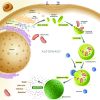Autophagy in malignant transformation and cancer progression
- PMID: 25712477
- PMCID: PMC4388596
- DOI: 10.15252/embj.201490784
Autophagy in malignant transformation and cancer progression
Abstract
Autophagy plays a key role in the maintenance of cellular homeostasis. In healthy cells, such a homeostatic activity constitutes a robust barrier against malignant transformation. Accordingly, many oncoproteins inhibit, and several oncosuppressor proteins promote, autophagy. Moreover, autophagy is required for optimal anticancer immunosurveillance. In neoplastic cells, however, autophagic responses constitute a means to cope with intracellular and environmental stress, thus favoring tumor progression. This implies that at least in some cases, oncogenesis proceeds along with a temporary inhibition of autophagy or a gain of molecular functions that antagonize its oncosuppressive activity. Here, we discuss the differential impact of autophagy on distinct phases of tumorigenesis and the implications of this concept for the use of autophagy modulators in cancer therapy.
Keywords: Beclin 1; KRAS; adaptive stress responses; inflammation; mitophagy.
© 2015 The Authors.
Figures




References
-
- Ahn CH, Jeong EG, Lee JW, Kim MS, Kim SH, Kim SS, Yoo NJ, Lee SH. Expression of beclin-1, an autophagy-related protein, in gastric and colorectal cancers. APMIS. 2007;115:1344–1349. - PubMed
-
- Aita VM, Liang XH, Murty VV, Pincus DL, Yu W, Cayanis E, Kalachikov S, Gilliam TC, Levine B. Cloning and genomic organization of beclin 1, a candidate tumor suppressor gene on chromosome 17q21. Genomics. 1999;59:59–65. - PubMed
-
- Anderson MA, Huang D, Roberts A. Targeting BCL2 for the treatment of lymphoid malignancies. Semin Hematol. 2014;51:219–227. - PubMed
Publication types
MeSH terms
Substances
Grants and funding
LinkOut - more resources
Full Text Sources
Other Literature Sources
Molecular Biology Databases
Miscellaneous

